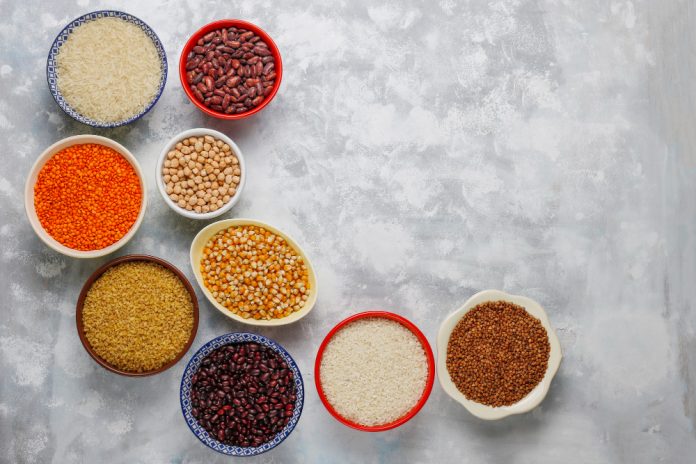Millet is a type of small-seeded cereal grain that has been consumed by humans for thousands of years. It is a staple food in many parts of the world, especially in Africa and Asia, where it is grown and consumed in large quantities. In recent years, there has been increasing interest in the potential health benefits of millet, including its ability to help prevent cancer. In this article, we will explore the evidence for millet’s potential role in cancer prevention, as well as some of the other health benefits of this ancient grain.

PC: Freepik
What is Millet?
Millet is a type of cereal grain that is part of the Poaceae family. It is a small-seeded grain that is typically grown in warm, dry climates, and it is highly adaptable to a variety of growing conditions. There are many different types of millet, including pearl millet, finger millet, foxtail millet, and proso millet, among others. Each type of millet has its own unique characteristics, and they are used for a variety of different purposes, including as a source of food, animal feed, and even as a component in biofuels. Millet is known for its nutritional value, as it is a rich source of dietary fiber, protein, and several important vitamins and minerals. It is also gluten-free, making it a popular choice for people with celiac disease or gluten sensitivity.
What is Cancer?
Cancer is a complex group of diseases that can affect any part of the body. It occurs when abnormal cells grow and divide uncontrollably, forming a mass of tissue called a tumor. These tumors can be benign (non-cancerous) or malignant (cancerous). Malignant tumors can invade nearby tissues and organs, and they can also spread to other parts of the body through the bloodstream or lymphatic system. There are many different types of cancer, and each type has its own unique characteristics and risk factors.Cancer is a major public health problem around the world, and it is one of the leading causes of death in many countries. According to the World Health Organization (WHO), there were 19.3 million new cases of cancer and 10 million cancer-related deaths in 2020. The most common types of cancer are lung, breast, colorectal, prostate, and stomach cancer, but there are many other types as well.

PC: Freepik
Can Millet Help Prevent Cancer?
There is growing evidence to suggest that millet may have a role in cancer prevention. Some studies have shown that millet contains several compounds that may help protect against cancer, including antioxidants, phenolic acids, and phytoestrogens. These compounds have been shown to have anti-inflammatory, anti-tumour, and anti-cancer properties, and they may help reduce the risk of certain types of cancer.One study published in the Journal of Agricultural and Food Chemistry found that pearl millet contains high levels of antioxidants, including phenolic compounds and carotenoids, which may help prevent cancer. The study also found that the antioxidant content of millet was higher than that of other grains, such as wheat and rice.Another study published in the International Journal of Cancer found that consuming millet may help reduce the risk of breast cancer. The study, which was conducted in China, found that women who consumed the highest amounts of millet had a lower risk of breast cancer compared to those who consumed the lowest amounts. The researchers suggested that the high fiber content of millet may be one of the reasons why it has a protective effect against breast cancer.
In addition to breast cancer, there is some evidence to suggest that millet may also help reduce the risk of other types of cancer. For example, a study published in the Journal of Medicinal Food found that consuming finger millet may help protect against colon cancer. The study, which was conducted in India, found that finger millet extract was able to inhibit the growth of colon cancer cells in a laboratory setting.While the evidence for millet’s potential role in cancer prevention is promising, it is important to note that more research is needed to fully understand the relationship between millet and cancer. It is also important to keep in mind that no single food or nutrient can prevent cancer on its own. A healthy diet that includes a variety of fruits, vegetables, whole grains, and lean proteins, along with regular exercise and other healthy lifestyle habits, is the best way to reduce the risk of cancer.
Other Health Benefits of Millet
In addition to its potential role in cancer prevention, millet has several other health benefits. Here are a few of them:
- Rich in nutrients: Millet is a rich source of several important nutrients, including dietary fiber, protein, B vitamins, magnesium, and phosphorus. It is also low in fat and calories, making it a healthy choice for people who are trying to lose weight or maintain a healthy weight.
- Gluten-free: Millet is naturally gluten-free, which makes it a popular choice for people with celiac disease or gluten sensitivity.
- May help regulate blood sugar: Some studies have shown that consuming millet may help regulate blood sugar levels, making it a potentially helpful food for people with diabetes.
- May improve heart health: Millet contains several compounds, including fiber and polyphenols, that may help reduce the risk of heart disease. One study published in the Journal of Food Science and Technology found that consuming millet may help lower cholesterol levels.

PC: Freepik
How to Incorporate Millet into Your Diet
Millet can be used in a variety of different dishes, and it is easy to incorporate into your diet. Here are a few ideas for how to use millet:
- Cook it like rice: Millet can be cooked like rice, using a 2:1 ratio of water to millet. Once cooked, it can be used as a base for stir-fries, curries, and other dishes.
- Add it to soups and stews: Millet can be added to soups and stews to add bulk and texture.
- Use it in salads: Cooked millet can be used in salads, either as a base or as a topping.
- Make porridge: Millet can be cooked with milk or water to make a warm, comforting porridge.
Conclusion
Millet is a nutritious and versatile grain that has been consumed by humans for thousands of years. While more research is needed to fully understand its potential role in cancer prevention, there is growing evidence to suggest that millet may have anti-cancer properties. In addition to its potential cancer-fighting properties, millet has several other health benefits, including its nutrient content and its gluten-free status. If you are looking to add more whole grains to your diet, consider incorporating millet into your meals.






